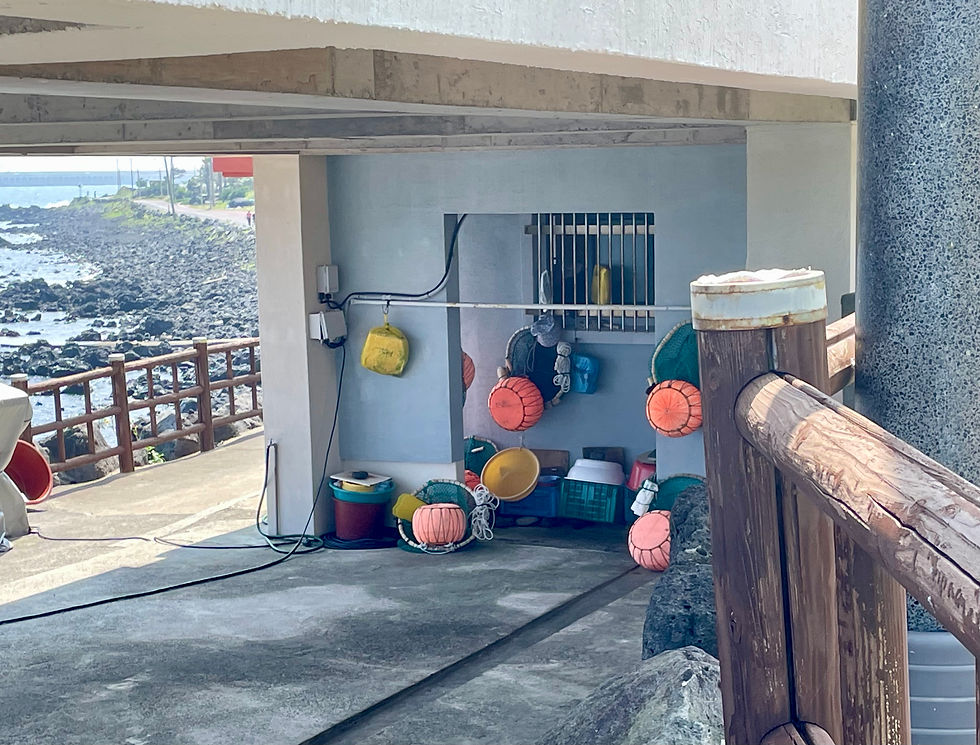The Sea Women of Jeju
- amyplotch
- Jul 9, 2021
- 3 min read
This is Ji-yun. She lives on Jeju, a South Korean island in the East China Sea. I met her after she dove into the ocean, stayed underwater without oxygen, and emerged with the octopus you see her holding. Ji-yun is training to be a Haenyo, a traditional Jeju woman diver.

We just spent ten days on Jeju, a place that Koreans call “The Hawaii of South Korea." (I can't vouch for that since I've never been to Hawaii.) It's a volcanic island with white and black sand beaches, little walls made of lava, fresh seafood and a hiking trail that circumnavigates the whole island. We hiked up a volcano crater, relaxed on black sand beaches wandered through small seafront villages and rode around on electric bikes. (Check out the photos at the end of this post to see it.) But what really fascinated us was the Haenyos . This post will teach you a bit about them.
Haenyos are a distinctive presence in their black wetsuits, round, green nets and big orange buoys. In addition to octopus, they collect abalone, squid, sea cucumbers, sea urchins and other local sea creatures. Their plentiful catches form the basis of the local diet. (We ate an enomous bowl of fresh seafood in sauce. It cost half the price of the pizza we had the following night!)

Their jobs are grueling. Women hold their breath for up to three minutes while diving almost 100 feet below the surface. Then the pry their prey off of rocks and out of crevices, put them in their nets, bring them to the surface and dive again. They wear lead weights around their waists to help them sink. They do this day after day for years. It is exhausting, dangerous work. And it doesn't let up. Many women continue diving into their eighties or even nineties.
When I met Ji-yun, she was in the middle of a 14-week training course taught by experienced divers. After the class ends, she will complete and 1 to 2 year internship with professional haenyos. Only after that can she become a professional.
When she does, she will become part of a strong community. The women work in collaboratives. They pool their catches and share the profits. The government has opened restaurants that serve their seafood as a way to provide support. Each collaborative has an oceanfront building that is a dressing room and meeting space.

Haenyos are iconic on Jeju. There are about 3,600 working divers on the island. All over the island there are statues of them, and a big museum that celebrates their culture. For many years, they were the breadwinners in their families. They also brought their children to work, where older women cared for them while they dove. And, they cooked and cleaned. (Men basically sat around and drank soju-- a Korean rice liquor) That gave women power within their homes. As a result, Jeju was more matriarchal than other parts of Korea.
Today, as in the US, most families rely on two incomes, so the matriarchal culture has declined. (And the men chip in!) But haenyos are still respected for their independence, tenacity and willingness to risk their lives to feed their families.
Here are a few photos so you can see the beauty of Jeju.
Thanks for reading. If you comment on the post, please feel free to sign your name so I can respond to you!





















I got to sit on a black sand beach in Hawaii, but I find these photos uniquely beautiful. And the Haeynos--their skill, their collaborative, their strength--extraordinary! Thank you so much, Amy, for this and your other moving stories that teach! Hoping to talk soon, Ann-Marie (Nazzaro)
Great story and photos. o any of the divers ever suffer from decompression sickness from the rapid successional dives? What about shallow water blackout from hyperventillation? (Do they hyperventillate?) Curious that in one photo, they are all fishing in the same small lagoon. Do they always stay together to dive, or do they venture out independently and then rejoin the others to share the catch at the end of the day? Thanks for sharing! Joy (Reidenberg)
I had read The Island of the Sea Women several years ago, and thoroughly enjoyed the fictional account of this culture. It was great to read about your visit there and know this community still exists. BTW Bryan and I haven’t worn our masks in Radburn for months!😅
I was missing your stories and was about to complain when you posted this new one today. Thank you! Adolfo.
Thank you for sharing - it's an amazing life these women lead.